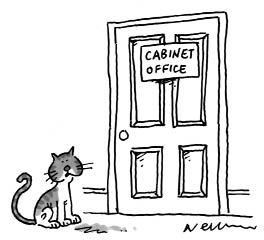David Cameron was two years old when Muammar Muhammad al-Gaddafi seized power in Libya.
David Cameron was two years old when Muammar Muhammad al-Gaddafi seized power in Libya. Forty-one years later, he finds himself the eighth British Prime Minister wondering what to do about the Mad Dog of the Middle East.
How Cameron approaches this question tells us much about his approach to leadership. Admirers of the Prime Minister often boast that he is ‘at his best in a crisis’. This is true. But what is also true is that things too often have to reach crisis point before the Cameron machine fully engages. This is why, after less than six years on the political frontline, he has three times had to give a speech to save his career.
Libya is a classic example of how a crisis ebbs and flows under the Prime Minister. Last Monday, as Cameron walked through Tahrir Square in Egypt, the Foreign Secretary ordered the evacuation of British nationals from Libya. The Foreign Office, having successfully carried out similar missions in Egypt and Tunisia using a private charter company, engaged the same firm again. There was little interest in this decision from No. 10. No one took the precautionary measure of calling a meeting of Cobra, the government’s emergency response committee.
This proved to be a problem, because the charter went wrong. When the plane was found to be unfit to fly, no alternative was on offer. Instead there was a ten-hour wait while the company tried to get hold of a spare part from a depot in Basingstoke.
The result was an embarrassing delay. The government ended up on the back foot as the press demanded to know why the evacuation was proving to be so much more difficult for Britain than for other countries. The situation was so bad that both the Prime Minister and the Foreign Secretary felt obliged to apologise to the British subjects stranded at Tripoli airport. If the government’s emergency response had been put into action when the evacuation was ordered, however, the delay could have been avoided or at least minimised.
The people stranded at the airport could very easily have been taken hostage by the Gaddafi regime. Delaying their evacuation also put the government in grave danger of earning a reputation for incompetence, a reputation that once acquired is impossible to shake off and fatal to any hope of re-election.
Eventually, with the assistance of the military, the evacuation was carried out and those British nationals working in the desert were airlifted to safety. Cameron, who was now — as the spin doctors put it — in ‘personal charge of the situation’, set about showing that Britain was leading on the Libyan crisis. Like a batsman who had been trapped on his crease for too long, he was determined to get on the front foot and assert himself.
This reached its apogee on Monday when Cameron came to the Commons to update the House on the situation in Libya. In contrast to his normal speaking style, he rattled through his statement at speed. It was as if he were trying to make up for lost time.
He announced that he had instructed the Ministry of Defence and the Chief of Defence Staff to investigate how a no fly zone over Libya could be established. Then, in response to a question, he entertained the idea of arming rebel Libyan forces.
The performance was impressive but slightly breathless. Certainly, Foreign Office sources were taken aback by the Prime Minister mooting the possibility of arming Libya’s rebels.
Government sources now talk about action in Libya being a matter of weeks not days away. They stress that it will take several days for plans to be worked out and delivered to the Prime Minister. One defence minister has even told colleagues that he doubts that Britain has the military wherewithal to do anything even if it wanted to. The military are talking about Britain contributing two to four planes if the no fly zone goes ahead.
Cameron’s approach to crisis management has, by hook or by crook, seen him through to date. But it is too risky. Problems need to be dealt with before they become crises.
Inside Downing Street, there has been a recognition that they need to do more to minimise the political risks they face. Since the departure of the PM’s communications director Andy Coulson, more emphasis is being placed on preparing the ground before announcing new policies.
Andrew Cooper, a controversial but talented pollster, has been brought in as head of political strategy. His job is to head off political problems and ensure that Cameron stays on the right side of public opinion. The No. 10 staff is also being expanded as Cameron returns to the Labour system of man-marking departments. This is meant to ensure that Downing Street is aware of everything taking place across Whitehall.
There also needs to be a cultural change, however. Ever since Cameron became leader, the motto of his operation has been too close to ‘sufficient unto the day is the evil thereof’. But getting through the day is not enough for a government that wants to reform the country’s public services radically and rejuvenate the economy.
Change needs to come from the top. Cameron needs to put more emphasis on planning for the medium term, on the nitty gritty of how his reforms are implemented. His first nine months in government should have taught him that he can’t rely on the civil service to do this for him.
We have learnt another thing about Cameron this week: he is intent on being a player on the world stage. He came to office suspicious of Tony Blair’s activist approach to the world. Foreign policy was one area where he was determined not to be the heir to Blair. But as Libya has shown, when there’s a crisis, Cameron is as keen to punch above his weight as Blair was.







Comments